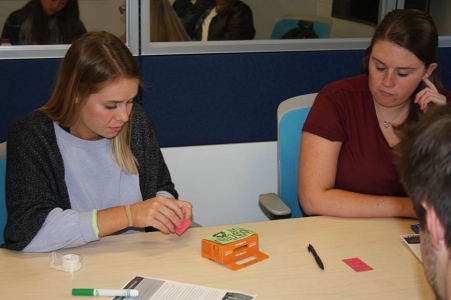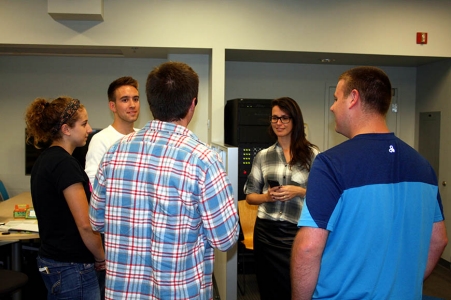UNICEF Development Entrepreneur Challenges Villanova Engineering Class

Olivia Cero ’17 ChE and Molly Jackson ’17 ME prepare the visual display for their idea—“Good Clean Fun.”
Over the past year, Villanova University’s College of Engineering has developed a unique partnership with the United Nations International Children’s Fund (UNICEF). In Nicaragua and Burundi, Africa, Dr. Pritpal Singh, Professor and Chairman of the Department of Electrical and Computer Engineering, has forged a relationship with the organization through which Villanova students and faculty will participate in projects related to many areas of common interest, including health, telemedicine, education and social programs. Developing community members’ entrepreneurial skills to foster business opportunities in these regions also is a priority, and it was this topic that brought UNICEF Divisional Planning Specialist Natalia Adler to Villanova’s campus in early October.
A self-described “development entrepreneur” in Data, Research and Policy, Adler has spent the past 10 years looking for ways to implement social innovations for children. Borrowing from the design world, she introduced a human centered design approach to support the development of regional policies for children in Nicaragua. Having implemented techniques familiar to engineers, including prototyping, service trials, ethnographic research, co-creation, and crowdsourcing, Adler’s experience made her an ideal guest lecturer for “Creativity & Innovation,” the first course in the College’s Engineering Entrepreneurship minor. Given that the semester’s term project is designing games and toys for children in the developing world, Adler’s presentation proved to be particularly relevant and insightful.

A team from the Creativity & Innovation class presents its idea to Natalia Adler (plaid shirt) in elevator pitch format.
Through the lens of human-centered design, Adler presented the class with an inquiry process that involves asking questions such as “What problem are you trying to solve?,” “For whom?,” and “What do they value and why?” With those questions in mind, students were provided with an archetype of “Slah”—a representative persona of a child living in one area of Nicaragua—and asked to develop a product or service to solve a specific problem he faces as a child in that community. The class was divided into teams and given 20 minutes to take on the challenge, after which they presented their ideas to Adler in elevator pitch format.
Team ideas included a portable basketball hoop, a trash net to block river debris so that children can safely swim, and development of a recreation center (much like the “Y”), which would be designed to meet community needs. Adler provided each group with valuable feedback on their pitches, reminding them, “Spend time identifying yourself with something specific that makes you memorable,” and “Don’t forget to close your pitch with an ‘ask,’ which should include your follow-up strategy.”
Adler’s visit concluded with a Q&A and an invitation to the students from Dr. Singh to become involved in UNICEF-Villanova joint projects.
